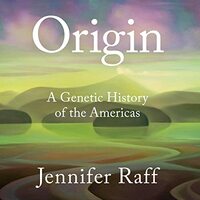Take a photo of a barcode or cover
Raff is an anthropological geneticist interested in the origins of the First Peoples of the Americas. This book gives a nice survey of the theories in the field of anthropology in the Americas.
Positives about this book: Raff offers alternative perspectives and an overview of the evidence for and against. She does a really nice job explaining the duty of geneticists and archaeologists to work collaboratively with First Nations communities to design and develop scientific inquiries into their ancestors. I also really enjoyed the few moments of fancy where she imagines a tender scenario by which ancient remains came to be.
Overall, I found a lot of this book to be repetitive and wished she would detail the sites a bit more as well as put some of the locations into better context. Many of the sidebars were distracting and I wished they were woven in to the main text in many places. Minor, but there were several typos that the editors should have caught. Finally, the photos in the glossy pages were honestly a bit disappointing and I was confused about what portions of the text they corresponded to.
Positives about this book: Raff offers alternative perspectives and an overview of the evidence for and against. She does a really nice job explaining the duty of geneticists and archaeologists to work collaboratively with First Nations communities to design and develop scientific inquiries into their ancestors. I also really enjoyed the few moments of fancy where she imagines a tender scenario by which ancient remains came to be.
Overall, I found a lot of this book to be repetitive and wished she would detail the sites a bit more as well as put some of the locations into better context. Many of the sidebars were distracting and I wished they were woven in to the main text in many places. Minor, but there were several typos that the editors should have caught. Finally, the photos in the glossy pages were honestly a bit disappointing and I was confused about what portions of the text they corresponded to.
While I agree with other reviews that the book would have benefitted from more input from actual archaeologists, Raff nevertheless does a great job explaining the field of aDNA and it’s implications in tracing migration routes to the Americas. Occasionally dry but ultimately interesting and well researched.
challenging
informative
reflective
slow-paced
challenging
informative
slow-paced
informative
reflective
medium-paced
Great info but too technical for me
There’s not much revelatory here although it was interesting on its release how the book gained a bit of traction as if it was showing some new data on new world expansion. There are way overlong passages with odd virtue signaling by the author that are quite cumbersome, and in the afterward she seems absolutely clueless when a fellow researcher confronts her about this, which the author seems to mistake as a sign of her passion of the topic.
challenging
reflective
medium-paced
I really enjoyed this book. I read this as a lay person and perhaps it could have been dumbed down a bit at times, would have been greatly appreciated.
There are moments when this book is a little technical, but Raff does a great job of exposing the complexities and considerations scientists must confront. Raff also addresses the ethics and history connected to genetics (and some other sciences) and advocates for consent, clarity, and the dismantling of silos within academia.
informative
reflective
medium-paced
4.5 stars. While "Origin" is an excellent book, it felt a bit dry. For example, the chapter describing how a geneticist performs a genetic analysis from ancient DNA was both extremely interesting (I learned a lot) and painfully boring (it is such a boring task!). Regardless of that issue, it is quite interesting to learn about the different theories (even the discarded ones!). What I was surprised is that there is little to no mention of the influence of South Pacific people, which I thought had an early influence in the continental peopling.





